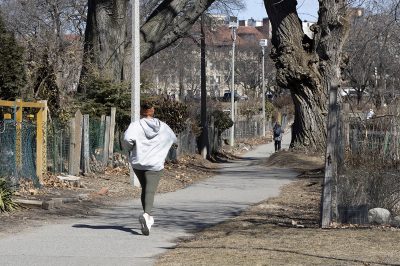Boston City Councilors Kenzie Bok and Michelle Wu are proposing a city-level “Conservation Corps” to support Boston’s climate and sustainability goals.

Modeled after the Civilian Conservation Corps of the 1930s New Deal, the local corps would work with local unions and City employees to retrofit historic buildings, plant and maintain trees and prepare communities for rising sea-levels, according to a hearing order filed in late January.
The Committee on Environment, Resiliency and Parks held a working session Tuesday morning, building on foundations created at a hearing in November and featuring a presentation by Philadelphia’s PowerCorpsPHL program — which recruits young adults and returning citizens to work on conservation projects.
City councilors, advocates and representatives from the Mayor’s Office convened to discuss how a similar program could be piloted in Boston.
During her opening remarks, Wu highlighted the impacts of the COVID-19 pandemic and the economic crisis it created on climate change and racial wealth disparities in the city.
“Our climate crisis and racial wealth gap [are] Boston’s twin underlying challenges that are most urgent across every community,” Wu said. “This program is really the embodiment of how we start to bring forward solutions that are just as interlinked and tackle all of these crises head on.”
A city-level Conservation Corps would enable Boston residents to be trained and employed to complete capital projects that, in turn, would foster a more sustainable and climate-ready city, according to the hearing order.
John Sullivan, chief engineer of the Boston Water and Sewer Commission, said while green infrastructure has been constructed in Boston, maintenance remains a challenge.
He cited New York, Philadelphia and D.C. as reference cities from which framework inspiration can be drawn.
“The thing we’ve learned is that the early bird gets the worm, but it’s the second rat that gets the cheese,” Sullivan said. “We learn from their mistakes, and that’s what’s so important, is to evaluate what everyone’s doing, take the best of the best and apply it here.”
In an interview, Bok said a Conservation Corps could both address Boston’s climate goals and provide new opportunities for residents impacted financially by the COVID-19 pandemic.
“We’re trying to take the best of all worlds,” Bok said. “We have all these great, really important climate goals, and there’s a lot of good work the City’s done on those, but we’re still not on track to really reach them yet. So, we feel like we need to take a big step forward.”
One of Boston’s climate goals is to achieve carbon neutrality by 2050.
Bok said a program similar to Philadelphia’s PowerCorpsPHL could help create jobs in urban forestry, green infrastructure and retrofitting, especially among Boston’s Black and brown youth.
Julia Hillengas, executive director of PowerCorpsPHL, said at the hearing the career-focused program features a partnership between city and industry.
“Our goal is to get people into high-quality jobs so that they can continue to move forward with their careers,” Hillengas said. “We strongly believe that you can help young people and individuals through helping the community at large.”
Bok said additional City funding is essential to successful sustainability efforts.
“The only way to achieve our climate goals is to accelerate our capital projects and really increase the share of them that are environmentally focused,” Bok said. “The idea here would be that having a dedicated workforce on that front could help make that happen.”
Bok, who chairs the Ways and Means Committee, which oversees government spending, added that the City typically leaves a portion of its authorized budget “on the table” — money that could fund the proposed corps.
While Boston hosts many high-paying jobs, Bok said those opportunities aren’t always extended to local residents and youth.
“There’s no way we can get to our climate goals without ramping up something like this,” she said, “and if we are going to ramp up something like this, it should also create economic opportunity and help deal with the racial and economic inequality in the city.”


















































































































